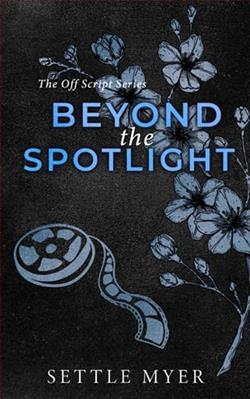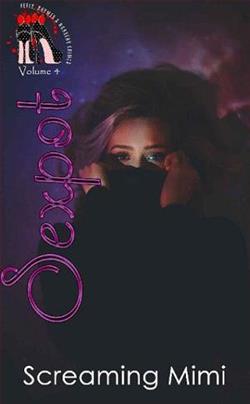Page 6 of Exit Lane
“I still think we’ll be friends, Marin,” he says, almost at a whisper.
I drop a shelled pistachio into his open palm as a peace offering. He couldn’t even wait an hour to bring it up. “I knowyou do. And I hope we are, Teddy. Someday, maybe you’ll be my old friend from Iowa, a place I haven’t been in years.”
“But why New York?”
I look up and see that we’re approaching Cleveland, and the midday sun is hitting Teddy’s hair, bringing out the copper tones. I’d been in my own world, at that moment in the kiss loop where he reached his left hand to the small of my waist and tugged on my belt loop. Daydreaming about a person in his presence is a universal sign you’re a goner. So is sharing vulnerable childhood memories.
“My dad took me to New York when I was eleven. Just me and him—not my sister, not my mom. He said I was his city kid. We saw Broadway shows and ate nachos at a fancy restaurant in Central Park.”
“Nachos at a fancy restaurant sounds like a perfect date, honestly.”
I laugh, trying not to linger on the choice of the word “date” and continue. Teddy keeps messing with the nonexistent AC and finding reasons for his hand to drift across the imagined boundary between us.
“New York was a completely different world. And even then, as a kid, I fell in love with that idea. I knew I’d come back, and then when he died, it was the thing I latched on to. This notion that life could and would be different in almost every way. I could and would be different if I could just get to the city.”
We’re quiet, and I think about the magnetic pull New York has had on me for almost half my life. Starting over there is all I ever hope for. Though I sometimes question what it says about me that my future looks like a place, I’ve been grateful to have a destination to cling to, even if the rest of my vision lacks... vision. Even though we just met, Teddy is part of my old life, the past I’m desperate to shed. And as daunted as I am to start from scratch, I can’t have someone I met a day ago hold me back.
Teddy looks over, worried. I wonder if he assumes my silence has to do with nerves, or the way his hand had wrapped around my neck like an old habit when we kissed, or the things we’ve divulged to each other already. It’s somehow all of that and none of that.
“Well, I’ve never been, and I’m terrified.”
I pause before responding, considering whether I find this relatable. I am terrified, but I’m not scared of the city. What I fear is anything that might pull me away from it. “You’ll have new classmates and built-in structure,” I say, and he nods like he needs to hear it. “You’ll do great.” I rest my head on the window.
He stretches out his right arm, and I hold my breath, wondering if he’s going to touch my shoulder. But instead he reaches behind us and grabs one of his pillows from the Tetris of the back row—books, garbage bags of sweaters. “Try getting some rest,” he says as he tucks it between me and the headrest.
Teddy
Marin is asleep practically on my lap, and I’m having a hard time parceling my nerves for law school and my inability to pinpoint my feelings about her. That’s what I-80 East is good for, I guess. Last night was a fluke—not indiscretion but a perfect storm of whiskey, nervous excitement, and a small-town cast of supporting characters. This explanation does not account for the fact that within minutes of safety-locking the door of my hotel room, I was coming into my hand. So much pent-up desire that all it took was a few strokes, and I was done, like I was sixteen again. I organize all my thoughts on a mental whiteboard while she naps, careful to stick within five miles of the speed limit. I’ll graduate from NYU. Get a job at a top law firm after impressive summer internships and perfect grades. Make lifelong friends and avoid alcoholism. Meet the woman I’m destined to marry—at a mutual friend’s birthday, maybe, and who would guess that she’s also ready to move back to the Midwest? Buy the house next to Carter’s grandma’s on Fifty-First Street. Pass the Iowa bar. Forget about this road trip in a matter of two to seven years.
My dad risked the balance of our life when he cheated, and it didn’t take more than three therapy sessions for me to realize that every decision I make is an attempt to conjure compulsory stability. Wanting things to be settled and safe is how I cope. I just wonder how Marin, potentially the total antithesis to my plan, fits.
We’re closer now, and the GPS countdown haunts mefrom where my phone is propped against the ashtray mount. The inevitability of this drive ending makes my stomach turn, my brain desperately scrambling to make sense of my feelings for Marin before our arrival.
I’m starving, I realize. The last proper meal we ate were those onion rings for dinner. Carefully, I pull over to search for sandwiches nearby. I don’t want to wake Marin. I get the sense she doesn’t allow herself to rest like this very often. Her forehead softens. There’s a piece of hair I want to push behind her ear.
As I pull up to a sub shop, I text Sloane to find out Marin’s ideal sandwich order. She responds immediately. “She wants an Italian Night Club, but if you ask, she’ll say she wants a Tuna Club.” Italian it is. It doesn’t occur to me until I’m contemplating the chip selection at checkout that my exchange with Sloane wasn’t tinged with the same fraught thrill I usually experience with any interaction with her.
I wait to eat until Marin wakes up, twenty minutes later. Unwrapping our sandwiches together in the late afternoon light strikes me as somehow romantically charged. So mundane as to be intimate. A distinctly different experience than I’ve had consuming dozens of other Turkey Toms in my life. I stuff that notion somewhere unseen.
“Salt and vinegar. Bold choice,” she says, opening the chips I got us to share. “I respect it.”
We reach at the same time, hands brushing, and I promise myself she didn’t feel what I just felt. Except she’s blushing.
It would be simpler to kiss her, but I scan my brain for conversation topics instead, trying to toe the line between making it obvious I want to know everything about her and keeping things chatty. Before I come up with anything, she asks, “What are you most nervous about?” She licks chip dust off a finger and twists her hair into a bun.
You, I want to say. I tug my ear until it hurts just enough to focus me. “Being away from Carter and my family,” I offer instead. “And about school. And the subway. Rats, too. I’m sure there were rats in the Midwest, but I didn’t see them. What if my MetroCard doesn’t work or I ask for Ranch and someone makes fun of me? I’m nervous about a lot.” It’s all out before I have the chance to self-edit.
Marin nods.She’s the coolest person I’ve ever met, I think. Both in presentation and in demeanor. It’s like her emotions are buried beneath layers of steel. I’ve never once known what she’s thinking in the twenty-four hours we’ve been together except for when we were kissing. Even her body language, the way she rolls her neck and fixes her gaze out the window, makes me feel like she’s a thousand miles away.
Until she responds in a quiet voice, “I’m nervous about everything, too.”
Before I can reply, the Buick hits a pothole, and the cassette tape player, defunct for years, slams into place. Kenny Loggins’s “Danger Zone” starts playing.
Marin laughs, and once she gets going, she can’t stop. She grips the dash, and her smile is the brightest I’ve seen. I’d do anything to see more of it, so I start singing, and I doa pretty impressive Loggins impression. It’s like this cracks the code of her emotional safe, and she lets go. She lets me see her. She joins in before the chorus swells, and soon we’re both at top volume with the windows hand-cranked open on the interstate. At the last verse, I turn to notice she’s tearing up. “Eyes on the road,” she mutters, pulling her sunglasses down from where she perched them on top of her head and shoving my shoulder. But it’s too late. Now I’m crying and not even trying to hide it, thinking about speeding into the unknown and wanting everything I left behind to stay the same in my absence.
It’s us, a few semitrucks, and the raucous chorus over the speakers. It’s funny how music really does make the drive go faster. Marin’s hair has come loose, and she’s using her hair clip as a microphone. I’ve opted for steering-wheel drums, and we’re both out of breath by the time the song ends.
“I promise to never bring up the time we both cried to Kenny Loggins in your dead grandma’s Buick,” Marin says, her face soft and kind before her eyes narrow. I can tell she doesn’t want to say whatever’s next. “I’m thinking we can sort of pretend like this entire road trip never happened if that’s OK with you.”















